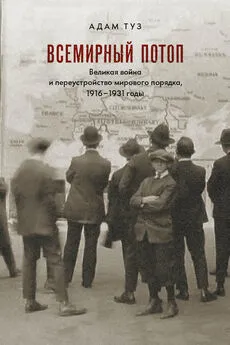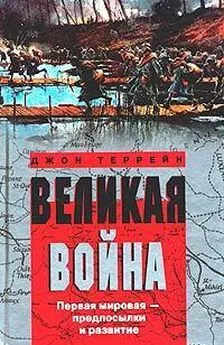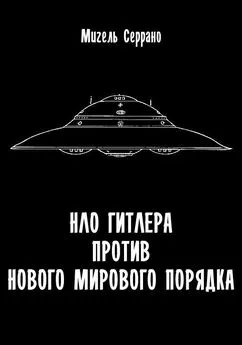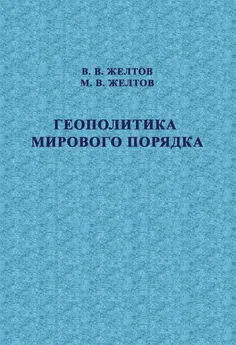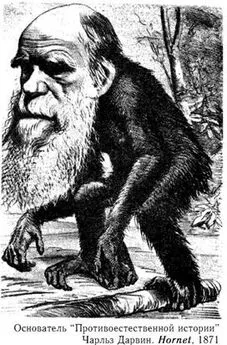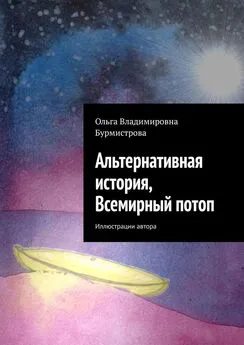Адам Туз - Всемирный потоп. Великая война и переустройство мирового порядка, 1916–1931 годы
- Название:Всемирный потоп. Великая война и переустройство мирового порядка, 1916–1931 годы
- Автор:
- Жанр:
- Издательство:Литагент ИЭП им.Гайдара
- Год:2017
- Город:Москва
- ISBN:978-5-93255-503-3
- Рейтинг:
- Избранное:Добавить в избранное
-
Отзывы:
-
Ваша оценка:
Адам Туз - Всемирный потоп. Великая война и переустройство мирового порядка, 1916–1931 годы краткое содержание
Всемирный потоп. Великая война и переустройство мирового порядка, 1916–1931 годы - читать онлайн бесплатно ознакомительный отрывок
Интервал:
Закладка:
1402
Cohrs, Unfinished Peace, p. 378–409.
1403
J. Keiger, Raymond Poincaré (Cambridge, 1997), p. 337–340.
1404
McKercher, The Second Baldwin Government and the United States, 1924–1929, p. 174.
1405
Beloff, Imperial Sunset, vol. 2, p. 142–143.
1406
L. Trotsky, «Disarmament and the United States of Europe» (October 1929) http: //www. marxists.org/archive/trotsky/L929/L0/disarm.htm; Л. Троцкий. Разоружение и Соединенные Штаты Европы // Бюллетень оппозиции (большевиков-ленинцев). 1929. 4 октября (№ 6), http: // web.mit.edu/fjk/www/Fl/BO/BO-06.shtml.
1407
D. Marquand, Ramsay MacDonald (London, 1997), p. 507.
1408
Z. Steiner, The Lights that Failed: European International History, 1919–1933 (Oxford, 2005), p. 510–518.
1409
Jacobson, When the Soviet Union, p. 183–188, 224–229.
1410
A. Waldron, From War to Nationalism: China’s Turning Point, 1924–1925 (Cambridge, 1995).
1411
J. Fairbank (ed.), The Cambridge History of China, vol. 12, Republican China, 1912–1949. Part 1 (Cambridge, 2008), p. 314–315; L. Humphreys, The Way of the Heavenly Sword: The Japanese Army in the 1920s (Stanford, CA, 1995), p. 130.
1412
Dayer, Bankers, p. 186–187.
1413
C. Martin Wilbur and J. Lien-Ying, Missionaries of Revolution: Soviet Advisers and Nationalist China, 1920–1927 (Cambridge, MA, 1989), p. 90–100.
1414
E. Fung, The Diplomacy of Imperial Retreat: Britain’s South China Policy, 1924–1931 (Hong Kong, 1991), p. 42–54.
1415
R. Hofheinz, The Broken Wave: The Chinese Communist Peasant Movement, 1922–1928 (Cambridge, MA, 1977).
1416
Wilbur and Lien-Ying, Missionaries of Revolution, p. 108–112; P. Zarrow, China in War and Revolution, 1895–1949 (London, 2005), p. 216–221.
1417
R. Karl, Mao Zedong and China in the Twentieth-Century World: A Concise History (Durham, NC, 2010), p. 29.
1418
S. Schram (ed.), Mao’s Road to Power: Revolutionary Writings, 1912–1949 (New York, 1944 vol 2, p. 421.
1419
J. Solecki and C. Martin Wilbur, «Blücher’s „Grand Plan“ of 1926», The China Quarterly 35 (1968), p. 18–39.
1420
H. Kuo, Die Komintern und die Chinesische Revolution (Paderborn, 1979), p. 148.
1421
B. Elleman, Moscow and the Emergence of Communist Power in China, 1925–1930 (London, 2009), p. 23–36.
1422
Karl, Mao Zedong, p. 30.
1423
Schram (ed.), Mao’s Road to Power, vol. 2, p. 430.
1424
S. Craft, V. K. Wellington Koo and the Emergence of Modern China (Lexington, KY, 2004), p. 86.
1425
Papers Relating to the Foreign Relations of the United States: Lansing Papers (Washington, DC, 1926), vol. 1, p. 924; A. Iriye, China and Japan in the Global Setting (Cambridge, MA, 1992), p. 99–101.
1426
Fung, Diplomacy, p. 100–111.
1427
Ibid., p. 131–132.
1428
A. Clayton, The British Empire as a Superpower, 1919-39 (Basingstoke, 1986), p. 207–208.
1429
Zarrow, China, p. 236–237.
1430
M. Murdock, «Exploiting Anti-Imperialism: Popular Forces and Nation-State-Building during China’s Northern Expedition, 1926–1927», Modern China 35, no. 1 (2009), p. 65–95.
1431
Fung, The Diplomacy of Imperial Retreat, p. 137–144.
1432
Kuo, Komintern, p. 202–217.
1433
Karl, Mao Zedong, p. 33.
1434
Hofheinz, The Broken Wave, p. 53–63.
1435
Craft, Wellington Koo, 92.
1436
M. Jabara Carley, «Episodes from the Early Cold War: Franco-Soviet Relations, 1917–1927», Europe-Asia Studies 52, no. 7 (2000), 1, p. 297.
1437
L. Viola, The War Against the Peasantry, 1927–1930: The Tragedy of the Soviet Countryside (New Haven, CT, 2005), p. 9–56.
1438
L. D. Trotsky, «The New Course in the Economy of the Soviet Union» (March 1930), http: // www.marxists.org/archive/trotsky/1930/03/newcourse.htm; Л. Троцкий. Экономический авантюризм и его опасности // Бюллетень оппозиции (большевиков-ленинцев). 1930. 13 февраля (№ 9), http: // web.mit.edu/fjk/www/Fl/BO/ BO-09.shtml.
1439
P. Duus (ed.), The Cambridge History of Japan, vol. 6: The Twentieth Century (Cambridge, 1988), p. 286–282.
1440
Humphreys, Heavenly Sword, p. 136–142.
1441
W. F. Morton, Tanaka Giichi and Japan’s China Policy (New York, 1980), p. 71.
1442
K. Colegrove, «Parliamentary Government in Japan», The American Political Science Review 21 no 4 (1927), p. 835–852.
1443
Humphreys, Heavenly Sword, p. 122–157.
1444
N. Bamba, Japanese Diplomacy in a Dilemma (Vancouver, 1972), p. 134.
1445
T. Sekiguchi, «Political Conditions in Japan: After the Application of Manhood Suffrage», Pacific Affairs 3, no. 10 (1930), p. 907–922.
1446
M. Friedman and A. Schwartz, A Monetary History of the United States, 1867–1960 (Princeton, NJ, 1963) и K. Polanyi, The Great Transformation: The Political and Economic Origins of our Times (Boston, MA, 1944), p. 21–44.
1447
B. Eichengreen, Golden Fetters: The Gold Standard and the Great Depression, 1919–1939 (Oxford, 1992) и A. Meltzer, A History of the Federal Reserve (Chicago, IL, 2003), vol. 1.
1448
H. James, The German Slump: Politics and Economics, 1924–1936 (Oxford 1986).
1449
Z. Steiner, The Lights that Failed: European International History, 1919–1933 (Oxford, 2005), p. 470–491; P. Heyde, Das Ende der Reparationen (Paderborn, 1998), р. 35–77; P- Cohrs, The Unfinished Peace after World War I: America, Britain and the Stabilisation of Europe, 1919–1932 (Cambridge, 2006), p. 477–571.
1450
S. Schuker, «Les États-Unis, la France et l’Europe, 1929–1932», in J. Bariéty (ed.), Aristide Briand, la Société des Nations et l’Europe, 1919–1932 (Strasbourg, 2007), p. 385.
1451
L. Trotsky, «Disarmament and the United States of Europe» (October 1929) http: // www.marxists.org/archive/trotsky/1929/10/disarm.htm; Л. Троцкий. Разоружение Соединенные Штаты Европы//Бюллетень оппозиции (большевиков-ленинцев). 1929. 4 октября (№ 6), http: // web.mit.edu/fjk/www/FI/BO/BO-06.shtml. и Соединенные Штаты Европы//Бюллетень оппозиции (большевиков-ленинцев). 1929. 4 октября (№ 6), http: //web.mit.edu/fjk/www/Fl/BO/BO-06.shtml.
1452
S. Adler, The Uncertain Giant, 1921–1941: American Foreign Policy Between the Wars (New York, 1965), p. 79.
1453
A. Ritschl, Deutschlands Krise und Konjunktur 1924–1934: Binnenkonjunktur, Auslandsverschuldung und Reparationsproblem zwischen Dawes-Plan und Transfersperre (Berlin, 2002).
1454
B. Fulda, Press and Politics in the Weimar Republic (Oxford, 2009), p. 144–1446.
1455
H. Mommsen, The Rise and Fall of Weimar Democracy (Chapel Hill, NC, 1996).
1456
F. R. Dickinson, World War I and the Triumph of a New Japan, 1919–1930 (Cambridge,2013), p. 185–186.
1457
Adler, Uncertain Giant, p. 130.
1458
R. Sims, Japanese Political History Since the Meiji Renovation: 1868–2000 (London, 2001), p. 150.
1459
I. Gow, Military Intervention in Prewar Japanese Politics: Admiral Kato-Kanji and the «Washington System» (London, 2004), 249–266, и J. W. Morley (ed.), Japan Erupts: The London Naval Conference and the Manchurian Incident, 1928–1932(New York, 1984).
1460
L. Connors, The Emperor’s Adviser: Saionji Kinmochi and Pre-War Japanese Politics (Oxford, 1987), p. 117–126; T. Mayer-Oakes (ed.), Fragile Victory: Saionji-Harada Memoirs (Detroit, IL, 1968).
1461
R. Boyce, The Great Interwar Crisis and the Collapse of Globalization (Basingstoke, 2009).
1462
Schuker, «États-Unis», p. 393.
1463
W. Lippman, «An American View», Foreign Affairs 8, no. 4 (1930), p. 499–518; R. Fanning, Peace and Disarmament: Naval Rivalry and Arms Control, 1922–1933 (Lexington, KY, 1995) p. 125.
1464
W. Lipgens, «Europäische Einigungsidee 1923–1930 und Briands Europaplan im Urteil der deutschen Akten (Part 2)», Historische Zeitschrift 203, no. 1 (1966), p. 46–89. Более подробно об этих надеждах см. в книге бывшего премьер-министра: E. Her-riot Europe (Paris, 1930).
1465
Boyce, Great Interwar Crisis.
1466
Société des Nations, Documents relatifs а l’organisation d’un régime d’Union Fédérale Européenne, Séries de publ. questions politique, VI (Geneva 1930), p. 1–16.
1467
Boyce, Great Interwar Crisis, p. 258–272.
1468
W. Lipgens, «Europäische Einigungsidee 1923–1930 und Briands Europaplan im Urteil der deutschen Akten (Part 2)», Historische Zeitschrift 203, no. 2 (1966), p. 341.
1469
H. Pogge Von Strandmann, «Großindustrie und Rapallopolitik. Deutsch-Sowjetische Handelsbeziehungen in der Weimarer Republik», Historische Zeitschrift 222, no. 2 (1976), p. 265–341; R. Spaulding, Osthandel and Ostpolitik: German Foreign Trade Policies in Eastern Europefrom Bismarck to Adenauer (Oxford, 1997), p. 267–269.
1470
W. Patch, Heinrich Brüning and the Dissolution of the Weimar Republic (New York, 1998).
1471
T. Ferguson and P. Temin, «Made in Germany: The German Currency Crisis of 1931», Research in Economic History 21 (2003), p. 1–53.
1472
Heyde, Das Ende, p. 130–144.
1473
Schuker, «États-Unis», p. 394.
1474
Boyce, Great Interwar Crisis, p. 305.
1475
Eichengreen, Golden Fetters, p. 278.
Читать дальшеИнтервал:
Закладка:
